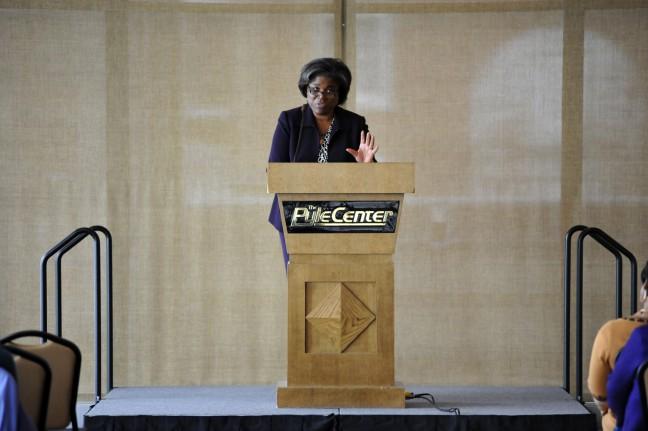Highlighting freedom, prosperity, security and investing in the future, Linda Thomas-Greenfield, U.S. assistant secretary of State for African Affairs, outlined strategies for the U.S. to achieve its goals in Africa at the Pyle Center Friday.
Thomas-Greenfield came to University of Wisconsin in 1974 and earned her masters in political science. She was appointed to her current position in August 2013 and has held numerous international positions prior to her current role.
“She is the highest-ranking Badger alum in [the] federal bureaucracy,” the Director of African Studies Program, Neil Kodesh, said.
Thomas-Greenfield spoke on four main “partnership-supporting goals” the U.S. has with Africa which include freedom, prosperity, security and investing in the future. The U.S. strategy for sub-Saharan Africa in relation to these goals includes strengthening democratic institutions, protecting human rights, supporting economic growth, advancing peace and security and improving opportunity and development, she said.
“None of these pillars can stand alone,” Thomas-Greenfield said. “We must take them all into account as we make our approach to Africa in order advance our long-term strategic goals of freedom, prosperity, security and investing in the future.”
Thomas-Greenfield said freedom meant free, fair and peaceful elections as well as advancing human rights. She mentioned northern Nigeria where Boko Haram, a militant group, has killed hundreds almost on a weekly basis. Thomas-Greenfield also pointed to anti-LGBT legislation in Africa “that criminalizes acts that should not be criminalized.”
When addressing the goal for prosperity in Africa, Thomas-Greenfield talked about the lack of electricity on the continent, where more than two-thirds of sub-Saharan Africans lack reliable access to electricity.
“[Imagine] if hospitals could properly store medicines and illuminate their operating rooms,” Thomas-Greenfield said. “Imagine … if government buildings had reliable wifi and computers that worked. Imagine the business opportunities that are being missed because there is no electricity on the continent of Africa.”
Addressing security, Thomas-Greenfield said the U.S. goal is to impress upon people in Africa that without security, freedom and prosperity are not possible. She said the recent tension between Ukraine and Russia should be an example to Africans of what they do not want going on in their own continent.
Investing in Africa’s future by building relationships with today’s youth is essential, Thomas-Greenfield said.
“These people have to be provided with leadership skills and have invested interest in the future of these countries,” Thomas-Greenfield said. “Otherwise they respond to the rhetoric and the extremist of Al-Shabaab or Al-Qaeda and become negative forces if we don’t harness their positive forces.”
Thomas-Greenfield said through the Young African Leaders Initiative, 500 African youth will visit Washington, D.C. this summer to learn networking and professional development skills.
Thomas-Greenfield said UW had helped her reach her own successes.
“I am a product of this university. My passion was nurtured at this campus,” Thomas-Greenfield said. “It has made me into the person I am today.”


